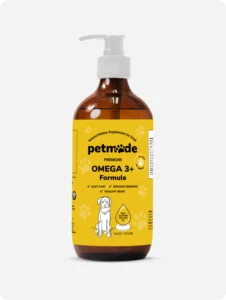Natural Anti-inflammatory Solutions for Dogs
When your dog is experiencing discomfort, natural anti-inflammatory solutions for dogs can be a great way to support their well-being. Inflammation can arise from a variety of causes, like injuries, arthritis, or even allergies, and while some of it is short-lived, it can sometimes become a long-term concern.
Chronic inflammation, in particular, may require more sustained management. While conventional medications are often helpful, many dog owners are turning to natural methods to reduce side effects and promote a more balanced, holistic approach to their dog’s health, aiming to maintain comfort and vitality for years to come.
Acute vs. Chronic Inflammation
Inflammation can be classified into two types: acute and chronic. Both can play different roles in your pet’s health. Acute inflammation is a short-term response, while chronic inflammation lingers and may lead to long-term health concerns.
When Inflammation is Short-term (Acute)
Acute inflammation is your dog’s natural defense mechanism. It occurs when the body responds to an injury, allergy, or irritation, working to protect the affected area and promote healing. During this time, you might notice swelling, redness, or warmth, which are signs that the body is working to recover. This type of inflammation is generally beneficial and immediate, helping your dog bounce back quickly.
When Inflammation Sticks Around (Chronic)
Chronic inflammation, however, can become a long-term issue. Prolonged inflammation may contribute to discomfort, joint pain, skin problems, or even conditions like arthritis. Over time, it can take a toll on your dog’s mobility and overall quality of life. Natural anti-inflammatory approaches can support your dog’s health by reducing the signs of chronic inflammation without the side effects of medications.
Top Natural Anti-inflammatory Foods for Dogs

Natural anti inflammatory for dogs foods can be a key factor in managing chronic inflammation and promoting overall well-being. By including specific foods rich in anti-inflammatory properties, you can help reduce inflammation and support your dog’s long-term health.
Ginger and Turmeric
If you’re considering an anti inflammatory diet for dogs, ginger and turmeric may offer powerful benefits. Turmeric, known for its curcumin content, helps reduce inflammation, especially when prepared as a paste mixed with a healthy fat for better absorption. Ginger may also alleviate discomfort and support joint health. You can safely integrate these into your dog’s meals by using turmeric paste or adding small amounts of grated ginger, but always consult with a vet for proper dosing.
Omega-3 Fatty Acids
Omega-3 fatty acids, found in fish like salmon and in fish oil supplements, are excellent for reducing inflammation at the cellular level. These healthy fats can promote joint health and support your dog’s mobility. Adding them to your dog’s diet is an easy way to support an anti-inflammatory lifestyle.
Sweet Potatoes or Pumpkin?
When considering anti-inflammatory food for dogs, both sweet potatoes and pumpkin offer valuable benefits, particularly for digestive health. Sweet potatoes are rich in fiber, vitamins, and antioxidants that help alleviate inflammation in the digestive tract. Pumpkin, on the other hand, provides a soothing effect on digestion, making it a great option for easing gastrointestinal discomfort.
Antioxidant-rich Foods
In addition to well-known anti-inflammatory foods, consider adding lesser-known options to your dog’s diet. Berries like blueberries and raspberries are packed with antioxidants, which help neutralize free radicals and reduce inflammation. Cruciferous vegetables such as broccoli and kale provide phytonutrients that can further support your dog’s health.
Local, Seasonal, and Organic Options
Using locally-sourced, seasonal, and organic anti-inflammatory foods for dogs can provide even more benefits. Organic foods are free from harmful pesticides and chemicals that might worsen inflammation, while seasonal options tend to be fresher and richer in nutrients. Locally-grown foods often have a higher nutrient content since they are harvested closer to peak ripeness, which supports better digestion and reduces inflammation naturally.
How to Reduce Inflammation in Dogs Naturally

For those wondering how to reduce inflammation in dogs naturally, a combination of dietary changes, lifestyle adjustments, and natural supplements can make a significant difference. By integrating anti inflammatory dog food, herbal supplements, and stress-reducing practices, you can help alleviate your dog’s discomfort and support long-term health.
Smart Diet Changes to Fight Inflammation
Incorporating natural, anti-inflammatory foods into your dog’s diet is an essential step. Fish oil, turmeric, and sweet potatoes are great options that can support joint health and help manage inflammation. For instance, fish oil, rich in Omega-3s, can be given in the morning to reduce joint stiffness throughout the day. Start with about 75mg of fish oil per 10 pounds of body weight.
Turmeric, when combined with healthy fats for better absorption, can be added to meals in small doses (1/8 to 1/4 teaspoon per 10 pounds of body weight). Sweet potatoes offer a fiber-rich, anti-inflammatory boost, perfect for digestion.
Creating a Stress-Free Environment
Reducing environmental stressors is another key to managing inflammation. Limit your dog’s exposure to allergens, pollutants, and stressful situations. Simple changes like using air purifiers, providing hypoallergenic bedding, and establishing a calm, quiet space for rest can significantly lower your dog’s stress levels, which helps in controlling inflammation.
Herbal Supplements and Natural Remedies
Herbal supplements like glucosamine and Boswellia are well-known for their joint health benefits, but lesser-known remedies like ashwagandha and bromelain can also play a role. Ashwagandha helps reduce both inflammation and stress, while bromelain (from pineapples) supports digestion and reduces swelling.
Reducing Inflammation Through Hydration
Hydration plays a crucial role in managing inflammation by flushing out toxins. Ensure your dog has constant access to fresh water, and consider adding hydrating foods like cucumber or watermelon to their diet. These foods are not only refreshing but also help keep your dog hydrated, aiding in the natural reduction of inflammation.
Natural Therapies to Calm Your Dog’s Inflammation

In addition to diet and supplements, natural therapies can help alleviate inflammation in dogs by promoting relaxation and supporting joint health. These therapies work alongside anti-inflammatory dog food and lifestyle changes, offering a holistic approach to reducing discomfort.
Aromatherapy for Relaxation and Healing
Aromatherapy is an emerging natural solution for managing stress-induced inflammation in dogs. Essential oils like lavender and chamomile, known for their calming properties, are safe for dogs when used correctly. By reducing stress, these oils can help alleviate inflammation that arises from anxiety or tension. You can use a diffuser or diluted oil on your dog’s bedding to create a relaxing environment that supports healing.
Chiropractic Care
Chiropractic care, though less common, is an effective option for dogs dealing with chronic joint inflammation. This hands-on therapy focuses on realigning the spine and improving joint mobility, which can help reduce pain and promote natural healing. Chiropractic adjustments may be especially beneficial for older dogs or those with conditions affecting mobility.
Conclusion
Natural anti-inflammatory solutions for dogs, such as a balanced diet, herbal supplements, and therapies like aromatherapy and chiropractic care, can be effective in managing inflammation and promoting your dog’s overall well-being. Incorporating anti-inflammatory foods like ginger, turmeric, and Omega-3s, along with stress reduction and proper hydration, can naturally alleviate discomfort and support your dog’s long-term health.
Yes, you can often combine natural anti-inflammatories with medications, but it’s essential to consult your veterinarian first. They can ensure that the combination is safe and won’t interfere with your dog’s existing treatment plan.
Natural remedies for dogs may take anywhere from a few days to several weeks to show noticeable results. The timing depends on the dog’s condition, the specific remedy used, and consistency in treatment and care.
While natural anti-inflammatory treatments for dogs are generally safe, risks can include allergic reactions or improper dosing. It’s essential to introduce new foods or supplements gradually and consult a vet to ensure safe and appropriate use.
Advertisement. This site offers health, wellness, fitness and nutritional information and is designed for educational purposes only. You should not rely on this information as a substitute for, nor does it replace, professional medical advice, diagnosis, or treatment. If you have any concerns or questions about your health, you should always consult with a physician or other health-care professional. Do not disregard, avoid or delay obtaining medical or health related advice from your health-care professional because of something you may have read on this site. The use of any information provided on this site is solely at your own risk.



















